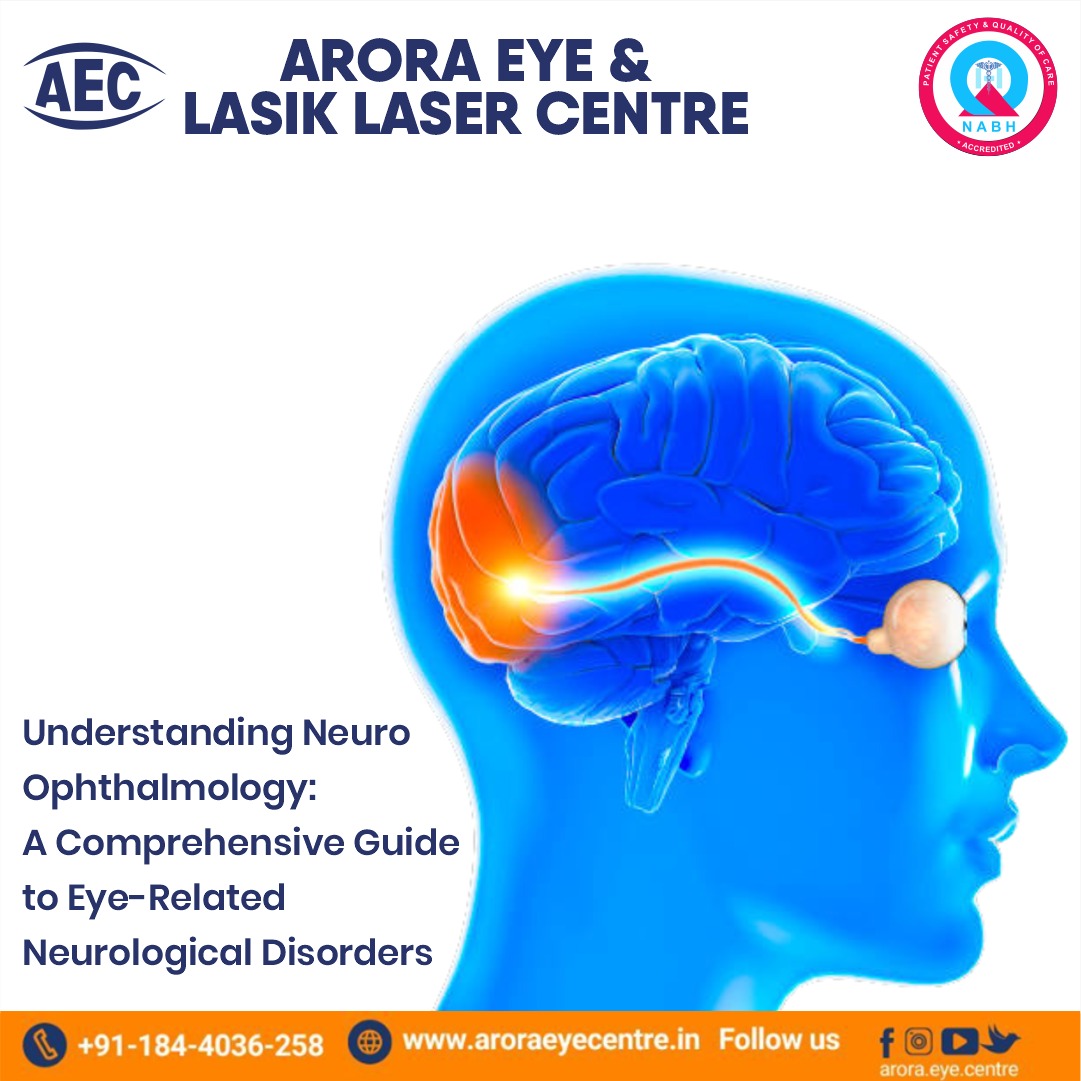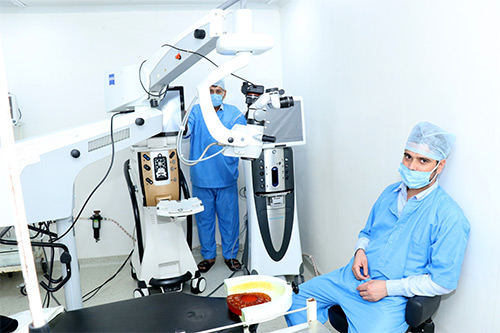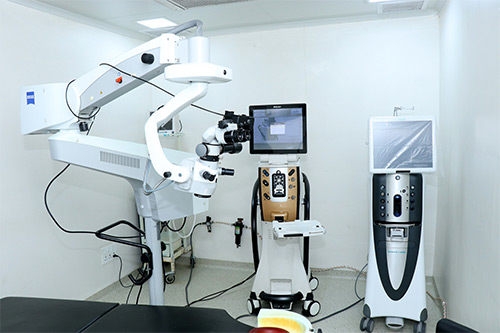
When it comes to maintaining good vision, most people think of routine eye exams or glasses. However, certain conditions require specialized care that goes beyond the surface of the eye. Neuro-ophthalmology is a unique branch of medicine that bridges the gap between neurology and ophthalmology, focusing on the complex connection between the eyes and the brain. At Arora Eye Centre, recognized as the best Neuro-Ophthalmology hospital in Karnal, we pride ourselves on offering expert care for patients experiencing neuro-ophthalmological disorders.
What is Neuro-Ophthalmology?
Neuro-ophthalmology is a subspecialty that addresses vision problems stemming from the nervous system. This includes disorders that affect the optic nerve, visual pathways, and areas of the brain responsible for processing visual information. Since the eyes are intricately connected to the brain, any disruption in this network can lead to significant vision problems.
Common Neuro-Ophthalmology Disorders
Understanding the conditions treated under neuro-ophthalmology is vital for recognizing symptoms early. Here are some common neuro-ophthalmology disorders:
1. Optic Neuritis
Optic neuritis involves inflammation of the optic nerve, often causing sudden vision loss, eye pain, and difficulty distinguishing colors. It is frequently associated with multiple sclerosis (MS). Early diagnosis is crucial for preventing further complications.
2. Papilledema
This condition occurs when there is swelling of the optic nerve due to increased intracranial pressure. Papilledema often signals an underlying neurological issue, such as a brain tumor or hydrocephalus.
3. Myasthenia Gravis
This autoimmune disorder affects the communication between nerves and muscles, leading to drooping eyelids, double vision, and difficulty focusing.
4. Optic Nerve Disorders
Conditions such as ischemic optic neuropathy and optic nerve atrophy can result in significant vision loss due to reduced blood flow or nerve damage.
5. Visual Field Defects
Neurological damage, such as strokes or brain injuries, can cause blind spots or loss of peripheral vision, affecting daily activities like driving and reading.
Symptoms of Eye-Related Neurological Conditions
Many neurological causes of vision problems present subtle symptoms initially, making it essential to recognize the warning signs:
- Sudden or progressive vision loss
- Double vision or blurred vision
- Persistent eye pain
- Difficulty focusing or controlling eye movements
- Visual field loss, such as tunnel vision
- Drooping eyelids (ptosis)
If you experience any of these symptoms, a consultation with a neuro-ophthalmologist at Arora Eye Centre is recommended.
Diagnosing Neuro-Ophthalmological Conditions
Diagnosing these conditions requires specialized tests to determine the underlying cause of the vision problem. At Arora Eye Centre, we employ advanced diagnostic tools, including:
- Optical Coherence Tomography (OCT): Provides detailed imaging of the optic nerve and retina.
- Visual Field Testing: Detects blind spots and other vision abnormalities.
- Magnetic Resonance Imaging (MRI): Helps identify brain or optic nerve lesions.
- Electroretinography (ERG): Assesses the retina’s electrical response to light stimuli.
Our state-of-the-art equipment ensures accurate diagnoses for optic nerve disorders treatment and other neuro-ophthalmological conditions.
The Eye and Brain Connection
The eyes are more than just windows to the soul—they’re directly connected to the brain. The eye and brain connection enables us to process visual information, interpret colors, detect motion, and navigate the world. Disruptions in this system, whether due to injury or disease, can impact vision and overall quality of life.
At Arora Eye Centre, we specialize in treating conditions where the brain and eye interface is affected, providing comprehensive care for patients with neuro-ophthalmological issues.
Treatment Options for Neuro-Ophthalmology Disorders
The treatment plan for neuro-ophthalmological disorders depends on the underlying cause. Some common approaches include:
1. Medications
Conditions like optic neuritis and myasthenia gravis often respond well to corticosteroids or immunosuppressive drugs.
2. Surgical Interventions
In cases of papilledema caused by increased intracranial pressure, surgical solutions such as shunts or optic nerve fenestration may be necessary.
3. Vision Rehabilitation
For patients with permanent vision loss, vision therapy and assistive devices can help improve functionality and quality of life.
4. Lifestyle Adjustments
Managing underlying conditions such as diabetes or hypertension can significantly reduce the risk of neuro-ophthalmological complications.
Why Choose Arora Eye Centre for Neuro-Ophthalmology?
1. Experienced Specialists
Our team includes experts with extensive experience in diagnosing and treating neuro-ophthalmology disorders.
2. Advanced Technology
With cutting-edge diagnostic and treatment equipment, we ensure precise and effective care for conditions like optic nerve disorders treatment.
3. Comprehensive Care
From initial diagnosis to post-treatment rehabilitation, our patient-focused approach ensures holistic care.
4. Trusted Reputation
Recognized as the Best Eye Hospital in Karnal, Arora Eye Centre is committed to delivering exceptional eye care services.
Empowering Patients with Knowledge
At Arora Eye Centre, we believe education is a critical component of healthcare. Through community outreach and patient education programs, we aim to raise awareness about symptoms of eye-related neurological conditions and the importance of early detection.
Experience World-Class Eye Care
Arora Eye Centre is not just a hospital; it’s a center of excellence where advanced technology meets compassionate care. Whether you’re dealing with complex neuro-ophthalmological issues or routine eye care, our team is here to guide you every step of the way.
With a reputation as the Best Eye Hospital in Karnal, we stand as a trusted name in the region.
Conclusion
Neuro-ophthalmology bridges the intricate connection between the eyes and the brain, addressing complex conditions that require specialized care. At Arora Eye Centre, we are committed to revolutionizing the diagnosis and treatment of eye-related neurological disorders. Whether it’s optic nerve disorders treatment or managing neuro-ophthalmology disorders, we provide expert care that transforms lives.
Visit us today and discover why we’re recognized not only for our expertise but also as the best Neuro-Ophthalmology hospital in Karnal and the Best Eye Hospital in Karnal. Your vision is our mission!






